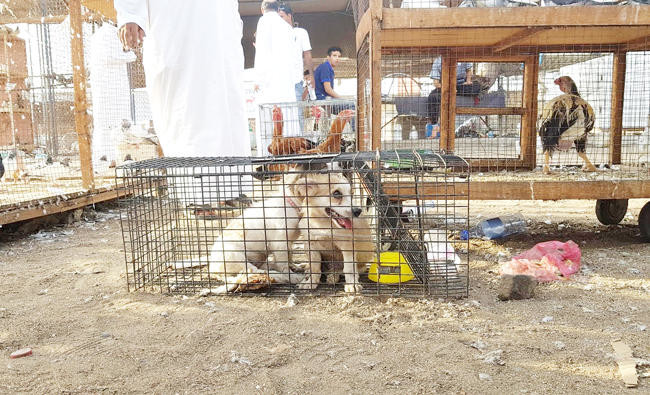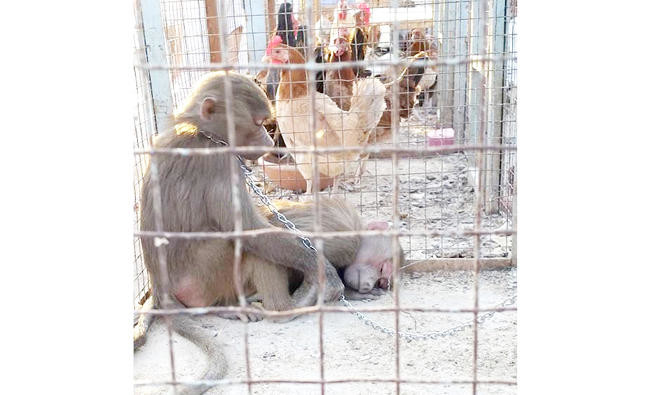JEDDAH: For some people in Saudi Arabia, an animal is a very profitable item, and the less they spend on it, the more they profit. This translates into a miserable existence for the animals, which are often kept in cramped filthy cages too small for them to stand or turn around in. They receive no veterinary care, very little to eat and drink, and spend weeks, if not months, in chains.
And when their soul eventually departs their body, they are tossed in the trash with the rest of the garbage — and the only sorrow caused by their passing is their owner’s regret at the few hundred riyals lost.
Female baboons are separated from their babies by hunters in the mountains of Taif; dogs are stolen from their owners in Obhur and female German Shepherd dogs are kept in a specially-made cage which forces their rear ends into a position that allows her to be easily mounted and impregnated by a male dog.
All this and much more cruelty takes place before these creatures even reach the animal markets.
The Pigeon Souk of Jeddah is where these animals are all sold despite Ministry of Environment, Water and Agriculture and Jeddah Municipality bans being in place. It is a dirty and dusty place where the corpses of birds and other animals are strewn around, and where a dry and dusty water bowl sits next to a pair of thirsty puppies sharing a bird cage.
“The condition and treatment of the animals being sold at the animal souk is miserable and inhumane to say the least,” said Sonja Svensek, founder of Pets in Need, a Jeddah-based online platform that connects thousands of like-minded people in order to help animals in need.
“Animals are kept in small dirty cages, some without food or water. Some are chained, and the majority are in questionable health. For any animal lover, it is heartbreaking to witness the state of the animals being kept and treated there.”
Arab News visited the souk, located in Jeddah’s Khomra District, and found kittens, cats and dogs openly available for sale despite a Municipality ban on trading in anything but birds at the Pigeon Souk.
One man was selling a mother cat and her kittens. “You can have them all for SR1,100,” he told Arab News. “Or SR200 for each kitten, or SR700 for the mother.” When asked why the mother was three times the price, he said that she could make babies and those could be sold.
A few meters away, in the farthest corner of the marketplace from the parking area, were two small dogs, less than a year old, looking frightened. The man selling them said they were from France. One had a pink collar and their claws were trimmed as if recently manicured.
It seemed likely the dogs had been stolen.
“Chances were that if your dog went missing or was stolen, it would end up at that market”, Svensek said. “Out of every 10 cases of missing dogs, about six are eventually found on sale there. We see this from the posts of desperate pet owners who have lost their pet, only to find it at the souk days, or sometimes weeks, later.”
A similar problem exists at the animal souk in Riyadh, according to Dr. Lana Dunn, a volunteer at Open Paws of Riyadh, a group of Saudis and expatriates who work to reduce the number of homeless pets, control stray cat populations and help animals in need of rescue.
The issue, Dunn said, is that the Municipality controls the pet stores, animal souks and stray animal populations, but is not in charge of the condition of the animals on sale. The Municipality says that is the responsibility of the animal welfare department of the Ministry of Environment, Water and Agriculture. But the Ministry says it has no authority over areas that the Municipality is in charge of. And that is how animal welfare falls through the cracks.
“The Riyadh animal souk is a health hazard to people as well as to the animals. It’s an embarrassment to the country in the eyes of visitors, and it’s also a bad example considering Islam’s obligations to care for God’s creatures,” Dunn said. “I have nothing good to say about it. I’m dumbfounded that it is allowed to go on.”
Arab News called and messaged Jeddah Municipality and the Ministry of Environment, Water and Agriculture for comment, but did not receive a timely response.
Despicable treatment of animals in KSA: Who is to blame?
Despicable treatment of animals in KSA: Who is to blame?

China grants visa-free entry to Saudi travelers

RIYADH: China is allowing visa-free entry for 30 days for travelers from Saudi Arabia, Oman, Kuwait and Bahrain in a one-year trial, the official Xinhua news agency reported on Wednesday.
The new policy begins on June 9, 2025, and will last until June 8, 2026, Chinese Foreign Ministry spokesperson Mao Ning said at a press briefing.
Passport holders from the four countries will be allowed to travel to China for business, sightseeing, visiting relatives or friends, exchanges and transit, Mao said.
China now grants visa-free access to all Gulf Cooperation Council countries, having implemented reciprocal policies with the UAE and Qatar since 2018.
“We welcome more friends from the GCC countries to embark on an impromptu trip to China,” Mao said.
Previously, Saudi Arabia had held Approved Destination Status with the East Asian nation, which came into effect on July 1, 2024.
This bilateral agreement gave access to tourists visiting the respective countries in groups.
The announcement is the latest step in strengthening ties between the two nations.
Saudi Arabia’s Vision 2030 aims to attract 5 million Chinese tourists annually by the end of the decade.
The two countries also share a strong trade relationship, and the Kingdom is China’s largest trading partner in the Gulf.
KSrelief expands aid across global crisis zones

RIYADH: Saudi Arabia’s aid agency KSrelief continues to make a significant global impact, providing critical assistance to some of the world’s most vulnerable communities.
In Somalia, KSrelief distributed 1,220 food baskets to families affected by floods in camps across the Banadir region, benefiting 7,320 people.
The Saudi aid agency also distributed 900 food baskets to vulnerable displaced families in Sudan’s Blue Nile State, benefiting 4,050 individuals.
In Yemen, KSrelief launched a project to treat childhood cancer in Mukalla district, Hadramout governorate, involving five volunteers specializing in various medical fields.
So far, the KSrelief medical team has examined 23 children and reviewed their treatment plans. They also conducted training sessions for local health care workers, benefiting 10 individuals to date, the Saudi Press Agency reported on Wednesday.
Since its launch in May 2015, KSrelief has implemented 3,435 projects worth more than $7.9 billion across 107 countries, in partnership with more than 317 organizations.
Study outlines forest fire prevention plan

RIYADH: The National Center for Vegetation Cover Development and Combating Desertification has completed a study to enhance forest protection and reduce wildfire risks in support of environmental sustainability goals.
Titled “Forest Fire Prevention and Post-Fire Recovery in the Southern and Southwestern Regions of Saudi Arabia,” the study was conducted in collaboration with King Khalid University and Monash University in Australia.
It includes an assessment of forest conditions and risk factors, the development of a digital database, and a review of preventive measures and community practices, the Saudi Press Agency reported on Wednesday.
The study proposes an integrated response plan involving relevant agencies, with defined roles and the use of modern tools such as early warning systems and drones.
It also offers field designs and sustainable alternatives for strategic firebreaks, a post-fire recovery guide, a performance evaluation tool, and a framework for joint operations.
To support this, the study outlines a mechanism for engaging local volunteer teams in forest areas through training, capacity-building, and coordination with authorities.
The study demonstrates institutional, technical, and community collaboration in forest protection. It reflects Saudi Arabia’s efforts to preserve natural resources and address climate-related challenges while balancing development with ecosystem conservation.
The national center continues to promote sustainable vegetation cover and has launched an initiative to plant 60 million trees — equivalent to restoring 300,000 hectares — by 2030.
New school for neurodiverse children to open in Riyadh

- Enrollment is now open for the 2025 academic year
RIYADH: A new school specializing in educating neurodiverse children aged 3 to 9 will open in Riyadh in September, it was announced on Tuesday evening.
Josour Schools held a seminar in Riyadh this week to make the announcement, highlighting its unique model, which combines education, therapy and family services.
The school, which will be located in Roshn’s Sedra 1 community, is the result of a partnership between the Josour Company and UK-based CareTech.
“CareTech is always rooted in the communities in which we operate our services,” Shokat Akbar, CEO of CareTech International, told Arab News. “For (Josour) to succeed, it must be rooted in the community and be … in partnership with the community.”
Aligned with Saudi Arabia’s Vision 2030 goals, Josour Schools adopts a British curriculum adapted to local cultural values.
Its small-class model, led by neurodiversity specialists, focuses on individualized education plans and combines education with therapeutic interventions.
“This school serves a critical purpose: providing good quality access to special education needs services for children,” Akbar said. “Inclusivity comes in many ways.
“Students (will) participate in society through art and sport, making their contributions visible.”
The school will have access to resources from CareTech’s global network of 47 UK schools and 550 specialized services.
“Teachers will attend CareTech UK schools as part of their induction and training,” Akbar said, adding that Josour’s therapists would collaborate with experts across CareTech’s global network, including researchers and practitioners.
Enrollment is now open for the 2025 academic year.
Ministry of Islamic Affairs launches 24/7 toll-free helpline for pilgrims

- Helpline will respond to pilgrims’ inquiries related to Hajj
RIYADH: Saudi Arabia’s Ministry of Islamic Affairs, Dawah and Guidance has launched a 24/7 toll-free helpline (800 2451000) to respond to pilgrims’ inquiries and provide religious rulings (fatwas) related to the Hajj.
The service provides religious guidance in 10 languages: Arabic, English, French, Turkish, Urdu, Indonesian, Bengali, Hausa, Amharic and Hindi.
The toll-free helpline is part of the ministry’s initiatives aimed at facilitating the performance of Hajj rituals in accordance with Islamic rules.
Through direct communication with a select group of qualified scholars and professional translators, the helpline ensures pilgrims receive reliable religious support.
The ministry has urged all pilgrims to make full use of this complimentary service, underscoring the Kingdom’s intent to deliver the highest standard of care during the pilgrimage.
The minister of Islamic affairs has assigned 300 scholars and advocates to provide fatwas and lectures for domestic Hajj campaigns for this year’s Hajj season, the ministry said.
Meanwhile, the ministry continues its efforts to serve pilgrims during Hajj by providing awareness and guidance services at the Aisha Mosque, one of the main stations frequented by pilgrims in Makkah.
The services include broadcasting awareness messages in several languages via electronic screens to enhance religious awareness and facilitate the performance of rituals.
In addition, around-the-clock field-monitoring tours are being conducted by male and female inspection teams to ensure the quality of services and address observations immediately.
The ministry also ensured the availability of Qur’ans and translations in several languages and organized the movement of crowds in the mosque and its courtyards to ensure smooth flow and comfort for visitors.





















